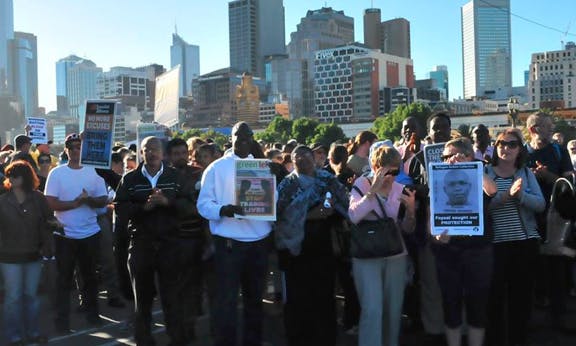Refugee solidarity action blocks traffic

Sudanese refugee Faysal Ahmed died on Christmas Eve at the age of 27. Responsibility for his death lies at the feet of the Australian government, which had detained him in a concentration camp on Manus Island for more than three years, and the jailers in that camp who ignored his repeated requests for medical attention.
Refugee rights activists gathered on Melbourne’s Princes Bridge on 3 January to hold a candlelight vigil, which spontaneously turned into a remarkable blockade. It took what had been a moment of grief and despair, and transformed it into an uplifting act of defiance and solidarity. This was an important step for the campaign.
At the end of the formal proceedings, following an aching minute of silence and prayer, a group of protesters stepped out into the traffic. A number of us quickly joined them, and for a moment everything was paused in confusion. Two young women, both People of Colour and on their first protest, became exasperated as our first attempt to occupy the road appeared to be fizzling out: “Is that it? Why are we leaving?” But I saw them again minutes later, linking arms and beaming at each other as the blockade finally took a firm hold. Dozens of us were there now, and with a clear purpose.
We held our ground for more than an hour, sustained by ceaseless chanting and donations of food and water from passers-by, some of whom even joined in. Standing right by my shoulder for the duration was a middle-aged Sudanese man carrying a tiny baby in one hand, his other hand raised in a clenched fist. He and I chanted together, laughed at the slow-witted cops, and linked arms despite the obvious lack of any impending police violence.
At one point, a passing trio of young skaters joined our ranks, handing out packets of chips and placing their skateboards in front of an aggressive and freshly polished white jeep, whose wealthy owner could only shoot exasperated glares at the police who’d allowed Princes Bridge to get so outrageously egalitarian.
At its height, there were well over 100 of us blockading the road, and in the blazing sun one of the city’s central thoroughfares stood frozen. Among the blockaders were whole families from the Sudanese community, elderly people from Grandmothers Against Detention, and a number of young people utterly fed-up with the never-ending horror being inflicted on refugees.
When we finally marched off, it was in high spirits and with a sense of achievement. This matters a great deal. It indicates that people outside the far left are prepared to take more dramatic action. The campaign needs to engage with this sentiment and organise those people. The days of passively bearing moral witness to the crimes and brutality of the Australian immigration department must give way to a focus on civil disobedience and disruption.
Such action can electrify and invigorate the campaign, drawing in new people and creating new activists – and it is the sort of solidarity that people resisting inside the camps need.
In response to Faysal’s obvious medical crisis and the neglect from staff, more than 60 detainees signed a petition demanding authorities provide him with proper care. Their petition was ignored, and when he finally died three days later, they rioted. Their resistance should be a lesson to all of us, inside and outside the camps.
It’s the sort of defiance we need if we’re to have any hope of battling the government’s unconscionable detention regime and the forward march of Pauline Hanson, Donald Trump, and the rest of the confident and ascendant hard right.